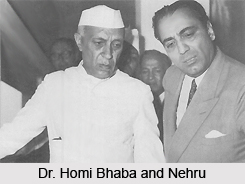
Homi Jehangir Bhabha a name considered synonymous with India’s atomic energy programme, was a great son of India. His contributions in the field of nuclear science gave India a giant leap in the field of science and technology. Consequently this led to the growth and progress in other fields. Indian atomic research has attained great heights today only due to the efforts of Homi Bhabha.
Dr Bhabha was born on October 30, 1909 in Bombay in a wealthy Parsi family. He had his early education in Bombay. After graduating from the Elphinstone College and the Royal Institute of Science in Bombay, he went to Cambridge University for further studies. From there he got his engineering degree in 1930 and a Ph.D. degree in 1934.
During his stay at Cambridge University, he worked with Niels Bohr on Quantum Theory. Later Bhabha worked with Walter Heitler in the field of cosmic rays. He became well-known for his theoretical explanation of the phenomenon of Cascade showers in cosmic rays. He did significant work in identifying the elementary particles called mesons.

Bhabha returned to India in 1940 and was first appointed as a Reader and then a Professor of Physics at the Indian Institute of Science, Bangalore. There he started work on cosmic rays. In 1945, he founded the Tata Institute of Fundamental Research and became its Director. He remained its Director throughout his life.
Apart from being an eminent scientist he was also a skilled administrator. His scientific achievements as well as friendship with the then Prime Minister, Jawaharlal Nehru, enabled him to get government finances for atomic programmes and research. Bhabha became the first Chairman of the Atomic Energy Commission of India in 1948.

Under his able guidance, Indian scientists worked towards the development of atomic energy and the first atomic reactor in Asia Apsara went into operation at Trombay near Bombay in 1956. Bhabha was Chairman of the first United Nations’ Conference on the peaceful uses of Atomic Energy. It was held in Geneva in 1955. He advocated a check on the proliferation of nuclear energy and outlawing of atomic bombs by all countries. He was also offered a post in the Union Cabinet which he refused. However, he continued to be the scientific adviser to Nehru and to his successor, Lal Bahadur Shastri.
His work on atomic energy won him many honorary degrees of Ph.D and D.Sc both in India and abroad.
Dr Bhabha died in an air accident on January 24, 1966 when he was going to attend an International conference. In his honour, Homi Jehangir Bhabha award has been instituted by the Indian National Science Academy. Dr Bhabha was mainly responsible for creating the Bhabha Atomic Research Centre (BARC) at Bombay. The centre was renamed after his death to cherish his memory. He will be remembered as the architect of India’s nuclear energy programme.

